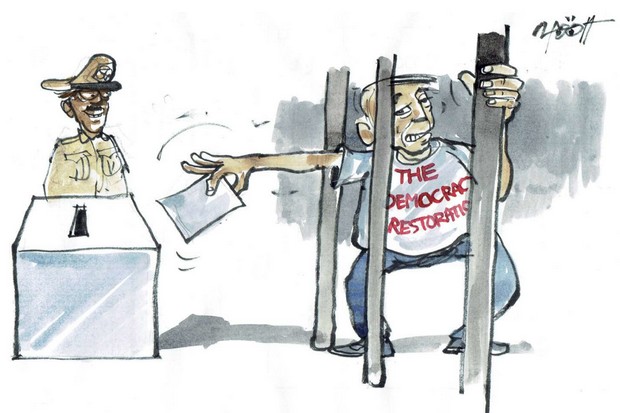
To any sensible person, the arrest and detention of 15 pro-election protest leaders and the subsequent legal proceedings against them are not just abusive and outrageous, but also unconstitutional.
Their alleged offences are nowhere near what one would call committing a crime. They only led small groups of people to stage a demonstration calling for the military government to return to its previous democracy roadmap by holding a general election by this November. They also called on the regime to step down before the poll and for the military to stop supporting the National Council for Peace and Order (NCPO), which toppled an elected government in the 2014 coup four years ago.

But when they decided to end the protest to avoid violent clashes, the police locked them up. They have been in jail since Tuesday afternoon.
In his response to the demonstration, junta leader and Prime Minister Prayut Chan-o-cha played the same old card. He branded them "lawbreakers", insisting the government has to enforce "the law" to maintain social order.
Following this remark, the police swiftly filed criminal charges against the 15 protest leaders. Violating the sedition law and the NCPO's order number 3/2015, which bans political gatherings of five people or more, are among the criminal charges.
The harsh act by the authorities may be to pander to the premier's tough stance. But it shows how unjustified and self-serving law enforcement is under the military government.
The United Nations Human Rights Office for Southeast Asia on Tuesday called for the immediate release of the activists, urging the Thai government to fully respect the rights to freedom of expression and peaceful assembly. The Human Rights Lawyers Association, a group of local lawyers and human rights and legal experts, also made the same demand while urging the regime to withdraw the charges.
Like many previous legal acts against the regime's critics, the authorities' use of the sedition law, Section 116 under the Criminal Code, against the protest leaders is aimed to silence them. The law carries up to seven years in jail for people who incite others to commit wrongdoing or unrest.
But the peaceful protest on Tuesday was in fact an act of freedom of expression which is allowed and guaranteed by the current constitution.
Neither the sedition law nor the NCPO's order can override the constitution's provisions on freedom of expression and peaceful protest.
The regime has paid little or zero attention to this legal point. Since the promulgation of the constitution more than one year ago, it has continued to slap sedition charges against its opponents while using the NCPO order as a tool to forbid political activities and gatherings.
Just a week earlier, the NCPO abused the sedition law in filing complaints against eight leaders of the Pheu Thai Party for speaking at a press conference criticising the regime's four-year stint at running the country.
In bringing such and many other serious criminal charges against the regime's critics, our law enforcement officials provided no justifiable grounds. They did not elaborate to what extent the actions of these people incited public unrest and posed a threat to national security.
With the new constitution, the regime's ban on political gatherings is no longer valid. Nor that its use of the sedition law against people's free speech is acceptable.
Gen Prayut may not bow to the demands of the pro-election protesters and insist on his latest poll date in February next year.
But he must bow to the constitution's spirit and demonstrate his commitment to the democracy roadmap by abolishing the NCPO order and putting an end to all sedition charges.
